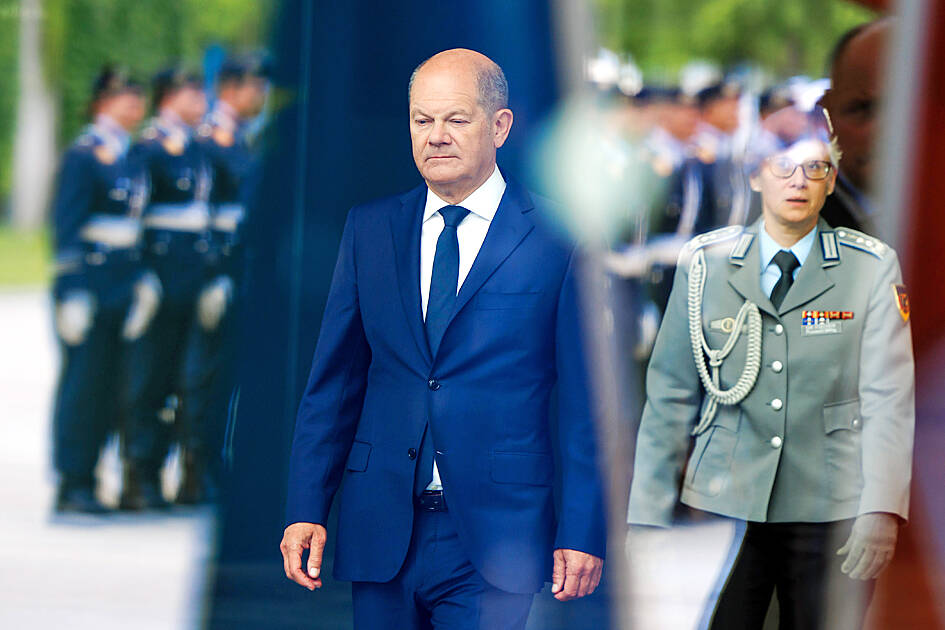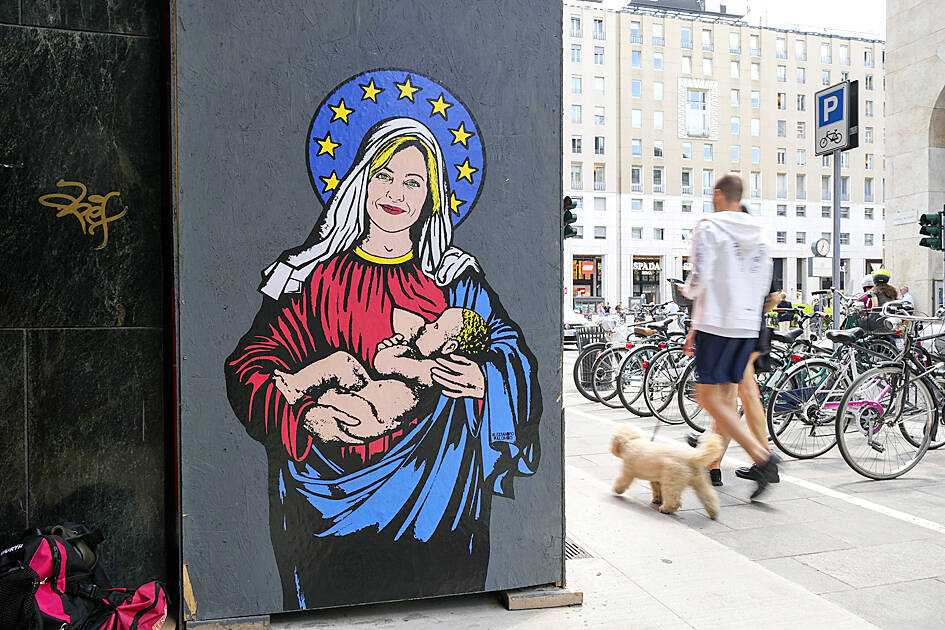A four-day election has shaken the foundations of the EU, with the far right rocking ruling parties in France and Germany, the bloc’s traditional driving forces. For the next five years it would be harder for the European Parliament to make decisions.
French President Emmanuel Macron called snap national elections after Marine Le Pen’s National Rally humbled his pro-European centrists in the polls. German Chancellor Olaf Scholz’s Social Democrats also suffered as the extreme-right Alternative for Germany shrugged off scandals to make massive gains.
Germany will not hold a snap election despite calls for Scholz to step aside after his ruling coalition’s dismal performance in the EU election, a spokesman for the chancellor said yesterday.

Photo: EPA-EFE
In Italy, the party of Prime Minister Giorgia Meloni, which has neo-fascist roots, won more than 28 percent of the national vote for the EU assembly, which would make it a key player in forming alliances.
“It is a resounding result,” Meloni said yesterday of the gains made by her Brothers of Italy party, despite a historically low turnout of 49.69 percent.
“It is very important politically and also moving personally,” she told Rtl radio, noting that elsewhere in Europe governing parties had suffered in the polls.

Photo: AP
The center-right European People’s Party (EPP) is projected to win 191 seats in the EU assembly and remains by far the biggest group. The EPP garnered a few more seats, but the parliament is also expanding from 705 seats in 2019 to 720 seats this year, so the increase was marginal. The second-biggest bloc, the center-left Socialists and Democrats, lost some ground, but with 135 seats comfortably retains its place.
EPP lead candidate, European Commission President Ursula von der Leyen, had flirted with parties to the right during election campaigning, but after early results were announced she called on the socialists and pro-business liberals to work together in a pro-European alliance.
The environmentalist Greens were perhaps the biggest losers overall. They are likely to lose about 20 seats in the European Parliament, almost one-third of their tally from 2019. A series of protests across Europe by farmers angered at the burden imposed by new climate laws helped to damage their chances.
Polish Prime Minister Donald Tusk’s centrist party clinched its first electoral victory over a right-wing populist party in a decade by taking the most votes in the European Parliament election.
Many viewed Tusk’s return to power last year as a rare case of a democratic party prevailing over populist and authoritarian forces. However, while the win solidified his position, the results also showed that his lead is small, and that support for the far right is rising.
In Spain, centrist parties contained a far-right surge in the European Parliament elections, helping to bolster Prime Minister Pedro Sanchez standing as one of Europe center-left’s leading figures.
The center-right People’s Party and Sanchez’s Socialists gained two-thirds of the vote, up from about half of the share in 2019, winning a combined 42 of the available 61 seats. While the anti-immigration Vox party’s vote share rose to 9.6 percent from 6.2 percent in 2019, it fell back from last year’s national election, when it won 12.4 percent.
In Hungary, upstart politician Peter Magyar smashed the nation’s image as one with no alternative to Prime Minister Viktor Orban’s rule by surging to second place in the European Parliament elections.
Magyar’s center-right Tisza came in at just under 30 percent in Sunday’s ballot, more than triple the support of a more established opposition alliance. The result makes him a natural challenger to Orban in the 2026 parliamentary elections.
While Orban’s nationalist Fidesz won the overall vote with almost 45 percent support, it was the worst result for the five-term leader in an EU election since Hungary joined the bloc in 2004.

Tropical Storm Gaemi strengthened into a typhoon at 2pm yesterday, and could make landfall in Yilan County tomorrow, the Central Weather Administration (CWA) said yesterday. The agency was scheduled to issue a sea warning at 11:30pm yesterday, and could issue a land warning later today. Gaemi was moving north-northwest at 4kph, carrying maximum sustained winds near its center of up to 118.8kph and gusts of 154.8kph. The circumference is forecast to reach eastern Taiwan tomorrow morning, with the center making landfall in Yilan County later that night before departing from the north coast, CWA weather forecaster Kuan Shin-ping (官欣平) said yesterday. Uncertainty remains and

SEA WARNING LIKELY: The storm, named Gaemi, could become a moderate typhoon on Wednesday or Thursday, with the Taipei City Government preparing for flooding A tropical depression east of the Philippines developed into a tropical storm named Gaemi at 2pm yesterday, and was moving toward eastern Taiwan, the Central Weather Administration (CWA) said. Gaemi could begin to affect Taiwan proper on Tuesday, lasting until Friday, and could develop into a moderate typhoon on Wednesday or Thursday, it said. A sea warning for Gaemi could be issued as early as Tuesday morning, it added. Gaemi, the third tropical storm in the Pacific Ocean this typhoon season, is projected to begin moving northwest today, and be closest to Taiwan on Wednesday or Thursday, the agency said. Today, there would likely

DISRUPTIONS: The high-speed rail is to operate as normal, while several airlines either canceled flights or announced early departures or late arrivals Schools and offices in 15 cities and counties are to be closed today due to Typhoon Gaemi, local governments announced last night. The 15 are: Taipei, New Taipei City, Taoyuan, Tainan, Keelung, Hsinchu and Kaohsiung, as well as Yilan, Hualien, Hsinchu, Miaoli, Chiayi, Pingtung, Penghu and Lienchiang counties. People should brace for torrential rainfall brought by the storm, with its center forecast to make landfall on the east coast between tonight and tomorrow morning, the Central Weather Administration (CWA) said. The agency issued a sea warning for the typhoon at 11:30pm on Monday, followed by a land warning at 11:30am yesterday. As of

CASUALTY: A 70-year-old woman was killed by a falling tree in Kaohsiung as the premier warned all government agencies to remain on high alert for the next 24 hours Schools and offices nationwide are to be closed for a second day today as Typhoon Gaemi crosses over the nation, bringing torrential rain and whipping winds. Gaemi was forecast to make landfall late last night. From Tuesday night, its outer band brought substantial rainfall and strong winds to the nation. As of 6:15pm last night, the typhoon’s center was 20km southeast of Hualien County, Central Weather Administration (CWA) data showed. It was moving at 19kph and had a radius of 250km. As of 3pm yesterday, one woman had died, while 58 people were injured, the Central Emergency Operation Center said. The 70-year-old